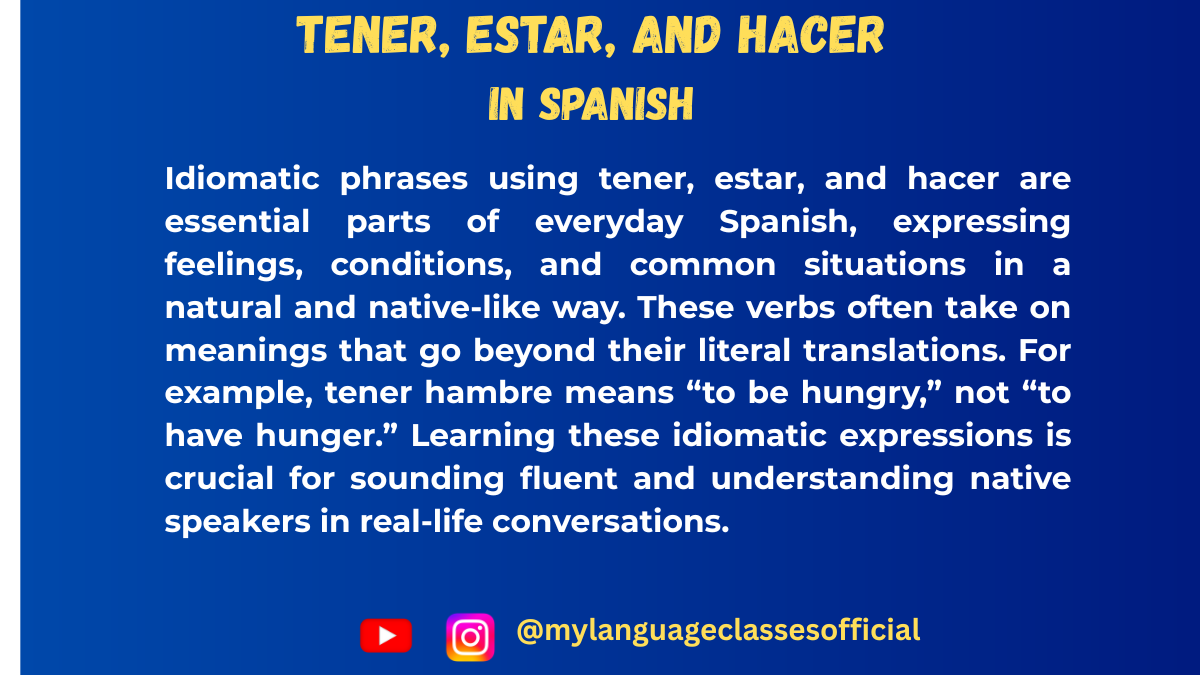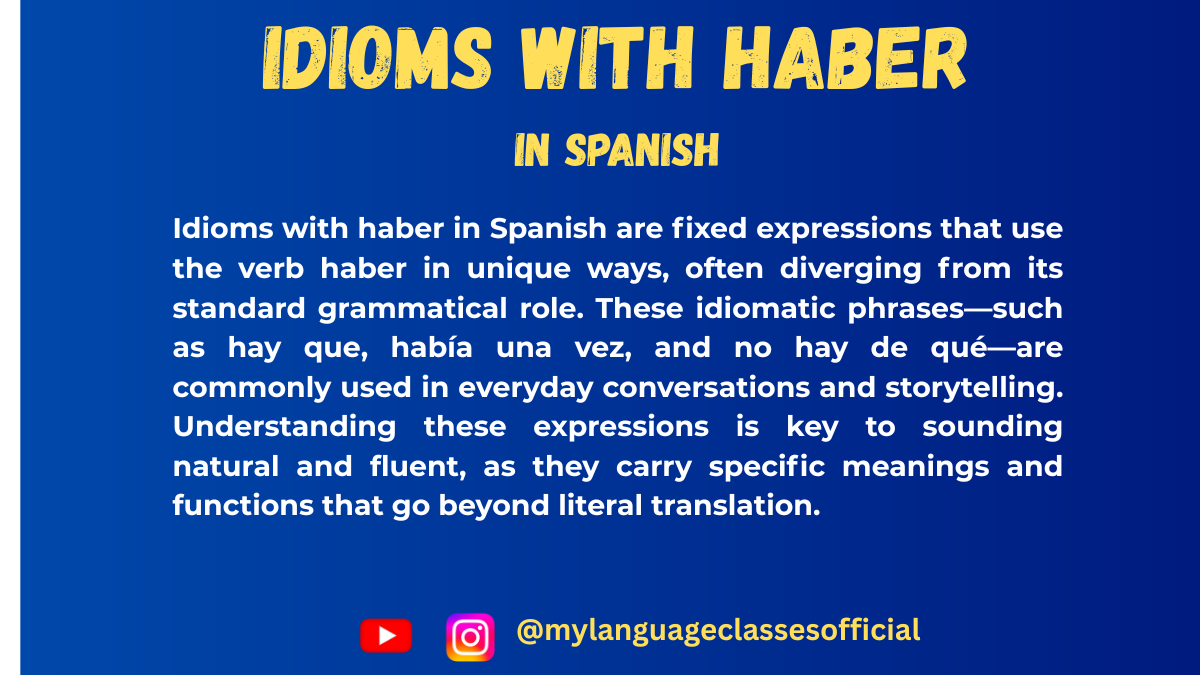Your cart is currently empty!
Tag: Spanish idiomatic expressions
-

Idiomatic Phrases Using Tener, Estar, and Hacer in Spanish
Mastering idiomatic expressions is essential for achieving fluency in Spanish. Many common expressions in Spanish use the verbs tener (to have), estar (to be), and hacer (to do/make), which often don’t translate literally into English. In this blog, we will explore frequently used phrases such as tener razón, tener ganas de, estar de acuerdo, and many others, along with their meanings, uses, and examples.
Understanding Tener, Estar, and Hacer in Idiomatic Expressions
In Spanish, some expressions that involve states, desires, or idiomatic ideas use tener, estar, or hacer, instead of ser or other verbs we might expect in English.
- Tener is often used for conditions, feelings, or necessity.
- Estar is used for temporary states, emotions, and agreements.
- Hacer is commonly used for weather expressions and actions.
To form these idiomatic phrases, we follow these patterns:
✅ Tener + noun → (e.g., tener razón – “to be right”)
✅ Estar + prepositional phrase/adjective → (e.g., estar de acuerdo – “to agree”)
✅ Hacer + noun → (e.g., hacer frío – “to be cold (weather-wise)”)
Common Expressions Using Tener, Estar, and Hacer
Here is a list of beginner and intermediate-level expressions along with their meanings and example sentences.
Expression Meaning Example 1 Example 2 Tener hambre To be hungry Tengo hambre, ¿puedo comer algo? (I am hungry, can I eat something?) Los niños tienen hambre después de jugar. (The children are hungry after playing.) Tener sed To be thirsty Después de correr, siempre tengo mucha sed. (After running, I am always very thirsty.) ¿Tienes sed? Hay agua en la nevera. (Are you thirsty? There is water in the fridge.) Tener razón To be right Tienes razón, era una mala idea. (You are right, it was a bad idea.) El profesor tenía razón sobre la respuesta. (The teacher was right about the answer.) Tener ganas de + infinitive To feel like (doing something) Tengo ganas de viajar a España. (I feel like traveling to Spain.) No tengo ganas de salir hoy. (I don’t feel like going out today.) Tener cuidado To be careful ¡Ten cuidado con el perro! (Be careful with the dog!) Debes tener cuidado al cruzar la calle. (You must be careful when crossing the street.) Tener sueño To be sleepy Después de estudiar, tengo mucho sueño. (After studying, I am very sleepy.) Ella siempre tiene sueño por la mañana. (She is always sleepy in the morning.) Estar de acuerdo To agree Estoy de acuerdo contigo. (I agree with you.) Mis padres no están de acuerdo con mi decisión. (My parents do not agree with my decision.) Estar de buen/mal humor To be in a good/bad mood Hoy estoy de buen humor. (Today I am in a good mood.) Después del examen, estaba de mal humor. (After the exam, I was in a bad mood.) Hacer frío/calor To be cold/hot (weather) Hace mucho frío en invierno. (It is very cold in winter.) En la playa, hace calor. (At the beach, it is hot.) Hacer falta To be necessary/to need Hace falta estudiar para el examen. (It is necessary to study for the exam.) Nos hace falta más información. (We need more information.)
More Example Sentences
- Hace mucho viento hoy. (It is very windy today.)
- Tienes razón, esto no es fácil. (You are right, this is not easy.)
- No estoy de acuerdo con esa idea. (I do not agree with that idea.)
- Hace falta paciencia para aprender un idioma. (Patience is necessary to learn a language.)
- Ten cuidado, la carretera está resbaladiza. (Be careful, the road is slippery.)
- Siempre tengo ganas de comer pizza los viernes. (I always feel like eating pizza on Fridays.)
- Mi hermana tiene sueño porque estudió hasta tarde. (My sister is sleepy because she studied late.)
- En verano hace mucho calor en mi ciudad. (In summer, it is very hot in my city.)
- Después del trabajo, mi madre siempre está de buen humor. (After work, my mom is always in a good mood.)
- Los estudiantes no están de acuerdo con las nuevas reglas. (The students do not agree with the new rules.)
Fill in the Blanks
- ______ cuidado cuando cruzas la calle.
- Después de correr, ______ sed.
- ¿Tú ______ de acuerdo con esa decisión?
- Esta sopa está caliente, ______ falta más agua fría.
- En invierno ______ frío, así que uso un abrigo.
- Hoy no ______ ganas de salir.
- Mi hermana siempre ______ sueño por la mañana.
- Tú siempre ______ razón en las discusiones.
- Mis amigos y yo ______ de buen humor porque es viernes.
- ¡______ falta estudiar más para el examen!
Answers:
- Ten
- Tengo
- Estás
- Hace
- Hace
- Tengo
- Tiene
- Tienes
- Estamos
- Hace
Things to Keep in Mind
- Tener expressions use a noun, meaning they follow gender and number rules. Example: Tener hambre (hunger, feminine noun) vs. Tener ganas de (desires, plural noun).
- Estar expressions often use prepositional phrases such as de acuerdo or de buen humor.
- Hacer expressions are commonly used for weather, e.g., Hace frío instead of Es frío.
- Some phrases change based on the subject. Example: Tengo ganas de comer (I feel like eating) vs. Tenemos ganas de viajar (We feel like traveling).
Conclusion
Using idiomatic expressions with tener, estar, and hacer correctly will make your Spanish sound more natural and fluent. These phrases often don’t translate directly into English, so understanding their structure and use in different contexts is essential. Keep practicing these expressions in daily conversations to improve your fluency and confidence in Spanish!
If you enjoyed this lesson, be sure to check out more posts like this on my blog at My Language Classes. Don’t forget to subscribe my YouTube channel and follow me on Instagram for the latest language learning tips and lessons. Leave a comment below to share your thoughts, or ask any questions you have.
Happy learning! 😊

